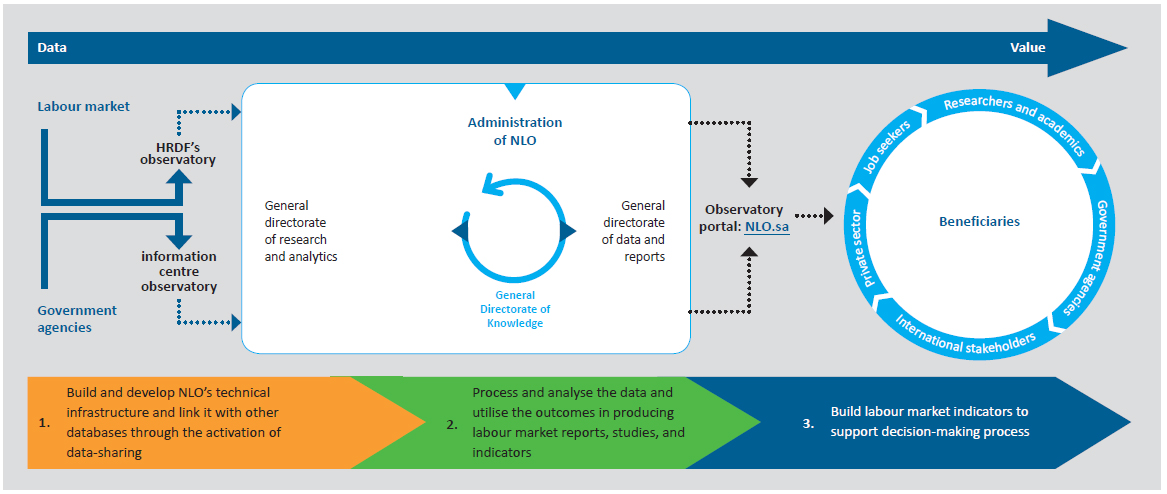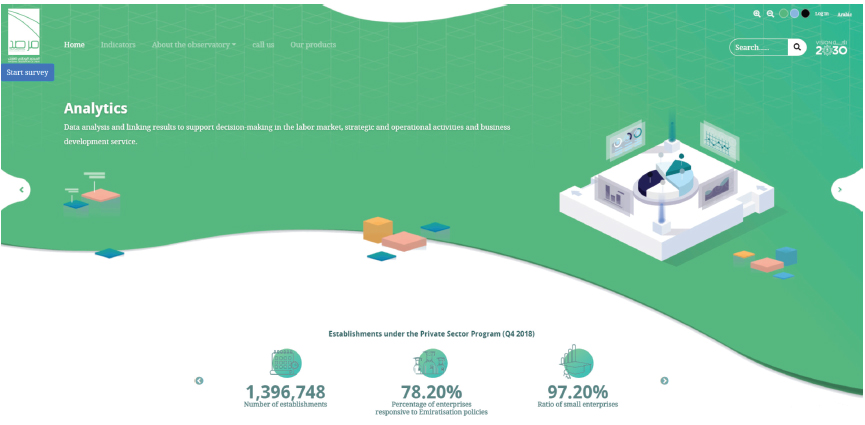Engagement and impact
Fulfilling customer expectations and sharing labour market insights
National Labour Observatory
The National Labour Observatory (NLO) was launched to provide consolidated data, generate statistics and advanced analytics, and to provide insights to manage knowledge on the labour market for the benefit of policy and decision-makers.
Strategic objectives
- Data processing and reporting: To provide accurate and reliable data to all clients
- Advanced analytics: To provide analysis and visualisation for business partners
- Labour market research management: Building a network of experts and specialists to meet labour market challenges
- Knowledge and education: To manage and disseminate knowledge
Operational objectives
- Data planning
- Data quality guarantee
- Developing reports and labour market dashboard
- Updating labour market metrics
- Provision of analytics to stakeholders
- Provision of development services to local partners
- Research project management
- Building expert network
- NLO data house
- Sharing content with partners
KSA labour market indicators
Several indicators have been established to reflect the status of KSA labour market. Each indicator includes its definition, source of data, mathematical formula, and periodicity. It was agreed to adopt a number of indicators for the labour market in the Kingdom of Saudi Arabia, which will be shared with the decision-makers in the system and published on the NLO portal. The indicators are divided into four main groups:
- Indicators of social insurance subscribers in the private sector
- Indicators of job mobility and stability within social insurance
- Indicators of graduates employment
- Indicators of Nitaqat establishments
Dashboards
Dashboards were developed for the following to include information on labour market and display indices that are automatically updated:
- Training support programmes
- Employment support programmes
- Taqat
- Hafiz
- HRDF systems
- Labour market
- Nitaqat

Labour market sector-wise studies
These studies on potential economic sectors were conducted to find effective and viable Saudisation solutions to create job opportunities for Saudi nationals.
The findings contribute to the formulation of programmes and initiatives in partnership with government, private, education, and training sectors to fulfil the HRDF mandate.
Research collaboration and partnership
The joint research programme with the Kennedy School of Government (Harvard University) aims to promote applied research in building evidence-based labour market programmes and policies, and to identify appropriate intervention mechanisms to develop these programmes and policies.
Reports and analytics
Periodic bulletins that reflect labour market status, and detailed reports (sector-wise and region-wise), as well as tailored statistical reports for decision-makers within the labour system.
The National Labour Observatory portal NLO.sa
The National Observatory of Labour e-portal is developed to reflect NLO’s role and enable users to access its services and products such as interactive indices and dashboards of KSA labour market. There are also additional content on multi disciplinary studies and analytical reports on the labour market.
Knowledge initiatives
Knowledge hour
It is an initiative aiming to enable HRDF employees to share information and data in a way that is projected to sustain knowledge and experiences through learning. 413 knowledge hours were conducted in 2018.





